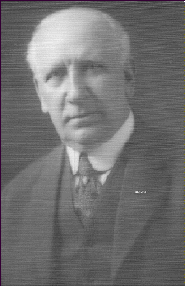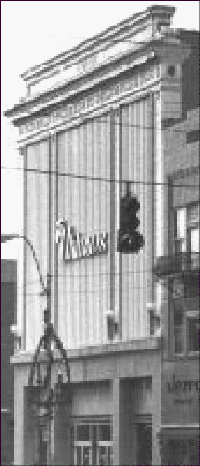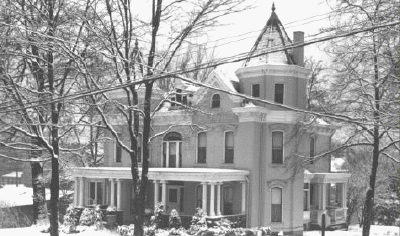| After the recent
announcement about the dismantling of Monarch Machine Tool Company, the history of this important enterprise was chronicled in the pages of this
paper. The creative vision and sacrifice of one man was instrumental in forging the entity
that Wendell Whipp and others would make famous. This is his story.
The date was January 22, 1926. The Sidney Daily News carried the
somber news: "Sidney Plunged Into Deep Mourning Over The Death of I. H. Thedieck."
The lead article declared that "Probably no man had a larger personal
acquaintanceship among the citizens of this community.... or has ever been held in such
high esteem." Who was this man and what role did he play in Sidney's history? 
Ignatius H. Thedieck was born in Alfhousen, Germany in 1855. Hishardworking parents
were involved in the mercantile trade. Thedieck moved to America with his family when he
was just 16. He attended public school in Dayton, where he mastered English and the
principles of business. After working as a store clerk in Cincinnati for three years, he
moved to Sidney when he was 20 years old. Thedieck started in the dry goods business in
1875. His first partner was Philip Raterman.
After Raterman retired just three years later, I.H. Thedieck entered into partnership
with his brother, Joseph. The firm 'Thedieck Bros.' was born. At the same time, I. H. made
a decision that was to have many far reaching and beneficial consequences. On October 16,
1878, he married Ida Wagner. Ida was one of the daughters of Mathias Wagner, one of the wealthiest
and most influential men in town.
Wagner's sons included
Bernard, Louis, William and Milton - the future founders of Wagner Manufacturing Company.
In 1882, with the
help of his father in-law, Mathias Wagner, Thedieck made plans for his future retailing
empire. Wagner purchased the lot to the north of the court house on Poplar Street to build
the most modern shopping facility in town. Young Thedieck shared the newly constructed
space equally with his brother in-law, William Wagner.
Virtually from the beginning, Thedieck's vision of retailing encompassed far more than
just selling to the Sidney trade. 'Mom and Pop' stores dotted the retailing landscape in
the 1880s. Branch stores were virtually unknown. However, Thedieck began to establish
stores in nearby villages and towns. The March 14, 1884, edition of the Sidney Journal carried
the news that "Thedieck Bros. will soon open a large dry goods store at Piqua. The
Piqua store will be the fifth...(with other) stores at Sidney, Lima, St. Marys and
Minster." In an understatement, the editor described the brothers as
"energetic businessmen."
By employing hard work and novel marketing efforts, Thedieck built a thriving business.
In 1884 he advertised in the Shelby County Democrat that "A Crash Is Coming!"
and promised to slash prices on goods he had imported from New York by 25 to 50 percent.
It wasn't long before his business, now called the Thedieck Department Store, expanded to
occupy the entire structure.
By 1900, Thedieck had become well-known throughout the Midwest as a master
merchandiser. His Sidney store became a shopping Mecca for a good part of Ohio. The
structure had its own steam heating plant, electric light system, and a state of the art
passenger elevator. He even offered free telephone service to his patrons.

To the left is
the former Thedieck building (constructed in 1914-1915) which until recently housed the
Uhlman’s Dept. Store. It is now home to Furniture Express and is located on the north
side of the Shelby County Courtsquare.

He conducted annual buying trips to New
York and Paris. Sidney ladies always had the latest of fashions from which to choose.
Biographer A. B. C. Hitchcock commented that "Such concerns as he has successfully
established are not built up by weaklings or second-rate men. They are the work of great
business generals - commercial Napoleans, so to speak."
I. H. and Ida raised a family consisting of four children: Charles, Frank, Inez and
Paul. Frank would later occupy positions of prominence at Monarch. The Thediecks built a
fine home at the corner of Walnut Avenue and North Street. It is currently owned by
Chester and Peg Morrow. (A picture of the home in earlier years is shown above).
I. H. Thedieck was now a wealthy man. However, his greatest contributions to his home
town were yet to come. Thedieck always placed the welfare of Sidney first. As the Daily
News would note later at the time of his death: "Few names will ever be as
intimately connected with the development and industrial expansion of Sidney as that of I.
H. Thedieck." He personally brought several new businesses to Sidney to increase
the economic well being of the town, including the Sidney Machine Tool Company. Thedieck shared his vast
business experience with numerous businesses, including Whipp Machine Tool Company,
Anderson Body Company, and the First
National Exchange Bank. Thedieck was also the driving force behind the founding of the
Sidney Telephone Company. His most significant contribution, however, was the creation of
Monarch.
In 1909 he became convinced that Sidney needed another source of employment. Joining
Thedieck as incorporators of the new business were J. O. Amos, W. H. Wagner, and E. E. Kah.
Thedieck chose his associates carefully. These men, and others who served on the original
board of directors, were the 'who's who' of the Sidney business community. Wagner, for
example, was simultaneously the president of Wagner Manufacturing Company, the First
National Exchange Bank and the Sidney Telephone Company.
There was
never any question that the inspiration and leadership for the venture came from Thedieck,
however. As the editor of the Sidney Journal noted in June 5, 1909 edition: "The
credit for this new factory belongs to Mr. Thedieck, who has had numerous offers from
other cities, but his desire to see Sidney grow larger and greater would not permit him to
consider a deal from outsiders, hence the locating of it here."
The men raised funds in the community by
hiring a driver and wagon to go around the courtsquare, soliciting investors for the
venture. The capital was raised in a few weeks. A potential site was secured on Oak Street
in Sidney. However, the company needed machines and supplies, and it had none. The story
behind the acquisition of the needed equipment shows a different side of I. H. Thedieck.
In 1898, Thedieck loaned a sum of money to his wife's cousin, A. P. Wagner, the owner
of A. P. Wagner Tool Company. Wagner moved his company to Detroit, and apparently carried
on his business in a satisfactory manner, but never repaid the loan to Thedieck. In 1909
Thedieck foreclosed on the loan, had all of the company's assets seized, and moved them to
Sidney. He sold it all to his new company for $25,000 in Monarch stock - making him the
majority shareholder. That decision was to reap significant dividends over the next few
years. . For example, in 1916, the company paid out nearly $450,000 in cash and stock
dividends to the shareholders.
Thedieck became the first president of Monarch. During the first few years, he had to
loan the company money with regularity to meet the weekly payroll. The company slowly
began to grow. He realized from the beginning that his talents lay in retailing, not
manufacturing. Thedieck hired his son in law, Wendell Whipp, as general manager of the
business in 1912.
Despite his numerous successes, Thedieck experienced hardships as well. In 1914, fire destroyed his department
store and his vast supply of merchandise. Undaunted, he vowed to rebuild. He erected a
modern, fireproof building which subsequently became the home of the Uhlmans Department
Store. The grand opening for the building was held on September 22, 1915.
Since Monarch was his 'baby', and he was the majority shareholder, it was
understandable that Thedieck kept close tabs on the business. His unannounced inspections
were legendary. One of the employees at that time described him as a 'tight-fisted
Dutchman'. For example, he would scold those responsible for leaving an unneeded light
bulb burning.
Monarch's company history records an embarrassing but humorous incident that no doubt
convinced Thedieck to leave the operation of the company in the capable hands of Wendell
Whipp. Many employees considered 'Mr. Thedieck' stuffy and a bit autocratic. While
inspecting the progress of the most recent building addition in 1918, Thedieck began to
walk boldly across the concrete floor, only to realize that the concrete had not dried.
Too proud to let the watching employees know he had made a mistake, he trudged on to the
other side before he discovered that he could not exit from that point. He repeated his
trek back across, to the delight of those watching.
As his
activities in his various businesses slowed, his involvement in civic affairs increased.
He was an active member of Holy Angels Catholic Church and the Knights of Columbus.
Thedieck was also president of the Sidney Commercial Club. The
Democrat once commented: "He was in the forefront of every movement that had
for its end the advancement of this community. His material support of every enterprise
that touched his imagination was liberal and unstinted."
His death in 1926 in many ways marked the
end of an era. General Amos, proprietor of the Democrat, realized that fact. He
penned a special tribute to Thedieck that was printed the day after his death. "He
highly graced and honored this community," Amos wrote. "Through his
activities he did more in a sound, creative way than any other man to here build an
industrial community, which, without his efforts, would not have existed."
In his farewell comment, General Amos summed up eloquently how the community felt about
I. H. Thedieck: "The work a good man has done is like a vein of water flowing
hidden underground, secretly making the ground green. By that will this man be
remembered."
[ Back to People Index ] |

